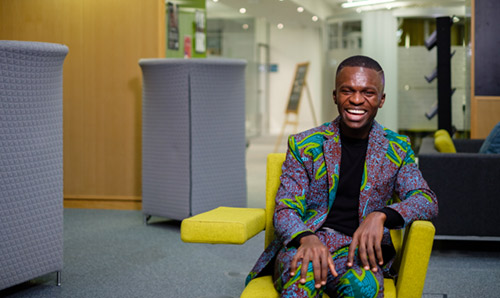Kwame Asamoah Kwarteng
Kwame, from Ghana, is studying MSc MSc International Development: Globalisation, Trade and Industry at the University's Global Development Institute (GDI).

I was fully employed as a Research and Programme Supervisor with The Quantum Group Limited in Accra, Ghana, where I worked in a team responsible for developing and implementing projects across the Cocoa Value Chain. I am at the Global Development Institute on a GDI Merit Scholarship.
Why international development?
My decision to study my course stems from the fact that in my last four years of work in the cocoa sector in Ghana, I couldn't understand why Ghana was only a household name in the production of cocoa beans and not chocolate? I did not understand why cocoa processing companies in Ghana were either collapsing or processing under capacity. I did not understand why farmers in Ghana and Ivory Coast who annually produced over 60% of the world’s cocoa beans were still wallowing in poverty, while chocolate - a derivative of cocoa - was a luxury product generating over $120bn for players in the downstream cocoa sector.
Finally, I also wanted to know how we can upscale and promote the micro manufacturing works being done by local artisans in Ghana (like the local footwear artisan I consult for) and other parts of the world, in order for them to be able to participate in the global markets, as a strategy towards job creation and poverty eradication.
On choosing the University
I choose The University of Manchester because, unlike other universities who pursue generic courses/programmes that I can find almost in anywhere in the world, they provided me with a customised Master’s program (i.e. MSc International Development: Globalisation, Trade and Industry) which was very well placed in providing me with the answers to the puzzles that I solve.
The best bits
I was selected as part of the ten students to participate in civil service insight day with the UK Department for Business, Energy and Industrial Strategy (BEIS), where I got the opportunity to lead two teams (of students from different universities across the UK) in presenting a communications strategy for the Britain EU exit policies and also how we can innovatively work with the ageing society in the UK, rather than seeing them as a burden.
I have also been accepted as a student member to the European Association of Development Research and Training Institutions (EADI), which gives me an opportunity to go through their mentorship and training programs to enhance my research skills and gain knowledge from the access I have to their development based research works. All these opportunities were available to me by virtue of me being a student at The University of Manchester.
What’s next?
I already have some business plans prepared which I will be pitching to potential investors - but after university, so I look forward to getting partners in to execute it. In the short-term, I look forward to working with policymakers in the cocoa sector or businesses whose focus is to upscale the businesses of local artisans in Sub Saharan Africa.
